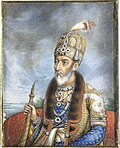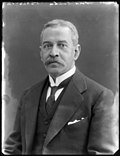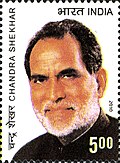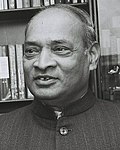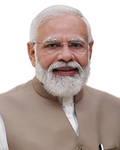Ó┤ćÓ┤©ÓĄŹÓ┤żÓĄŹÓ┤»Ó┤»ÓĄüÓ┤¤ÓĄå Ó┤¬ÓĄŹÓ┤░Ó┤¦Ó┤ŠÓ┤©Ó┤«Ó┤©ÓĄŹÓ┤żÓĄŹÓ┤░Ó┤┐Ó┤«Ó┤ŠÓ┤░ÓĄüÓ┤¤ÓĄå Ó┤¬Ó┤¤ÓĄŹÓ┤¤Ó┤┐Ó┤Ģ
List of Prime Minister
List of Prime Minister Mughal
List of Prime Minister Mughal
List of prime ministers of India
List of prime ministers of India
Legend
No.
Portrait
Name
Term of office
Appointed by
Party
70
Bonnerjee, Womesh Chandra Womesh Chandra Bonnerjee 1885
Bombay
Indian National Congress
71
Naoroji, Dadabhai Dadabhai Naoroji 1886
Calcutta
72
Tyabji, Badruddin Badruddin Tyabji 1887
Madras
73
Yule, George George Yule 1888
Allahabad
74
Wedderburn, William William Wedderburn 1889
Bombay
75
Mehta, Pherozeshah Pherozeshah Mehta 1890
Calcutta
76
Anandacharlu, Panapakkam Panapakkam Anandacharlu 1891
Nagpur
(70)
)
Bonnerjee, Womesh Chandra Womesh Chandra Bonnerjee 1892
Allahabad
(71)
Naoroji, Dadabhai Dadabhai Naoroji 1893
Lahore
77
Webb, Alfred Alfred Webb 1894
Madras
78
Banerjee, Surendranath Surendranath Banerjee 1895
Poona
79
Sayani, Rahimtulla M. Rahimtulla M. Sayani 1896
Calcutta
80
Nair, C. Sankaran C. Sankaran Nair 1897
Amaravati
81
Bose, Anandamohan Anandamohan Bose 1898
Madras
82
Dutt, Romesh Chunder Romesh Chunder Dutt 1899
Lucknow
83
Chandavarkar, N. G. N. G. Chandavarkar 1900
Lahore
84
Wacha, Dinshaw Edulji Dinshaw Edulji Wacha 1901
Calcutta
Indian National Congress
85
Swami Vivekananda
1902
86
Banerjee, Surendranath Surendranath Banerjee 1902
Ahmedabad
87
Ghosh, Lalmohan Lalmohan Ghosh 1903
Madras
88
Cotton, Henry John Stedman Henry John Stedman Cotton 1904
Bombay
89
Gokhale, Gopal Krishna Gopal Krishna Gokhale 1905
Banaras
90
Naoroji, Dadabhai Dadabhai Naoroji 1906
Calcutta
91
Ghosh, Rashbihari Rashbihari Ghosh 1907
Surat
1908
Madras
92
Malaviya, Madan Mohan Madan Mohan Malaviya 1909
Lahore
93
Wedderburn, William William Wedderburn 1910
Allahabad
94
Dar, Bishan Narayan Bishan Narayan Dar 1911
Calcutta
95
Mudholkar, Raghunath Narasinha Raghunath Narasinha Mudholkar 1912
Bankipore
96
Bahadur, Nawab Syed Muhammad Nawab Syed Muhammad Bahadur 1913
Karachi
97
Bose, Bhupendra Nath Bhupendra Nath Bose 1914
Madras
98
Sinha, Satyendra Prasanno Satyendra Prasanno Sinha 1915
Bombay
99
Mazumdar, Ambica Charan Ambica Charan Mazumdar 1915
Lucknow
List of prime ministers of India
List of prime ministers of India
Indian Armed Forces
No.
Portrait
Name(birth and death)
Term of office
Party
Took office
Left office
132
Javed Khan
30 May 2027
Incumbent
Military
Ó┤ĢÓ┤ŠÓ┤▓Ó┤ŠÓ┤ĄÓ┤¦Ó┤┐Ó┤»ÓĄüÓ┤¤ÓĄå Ó┤”ÓĄłÓĄ╝Ó┤śÓĄŹÓ┤»Ó┤«Ó┤©ÓĄüÓ┤ĖÓ┤░Ó┤┐Ó┤ÜÓĄŹÓ┤ÜÓĄŹ Ó┤¬ÓĄŹÓ┤░Ó┤¦Ó┤ŠÓ┤©Ó┤«Ó┤©ÓĄŹÓ┤żÓĄŹÓ┤░Ó┤┐Ó┤«Ó┤ŠÓ┤░ÓĄüÓ┤¤ÓĄå Ó┤¬Ó┤¤ÓĄŹÓ┤¤Ó┤┐Ó┤Ģ
No.
Ó┤¬ÓĄćÓ┤░ÓĄŹ
Ó┤¬Ó┤ŠÓĄ╝Ó┤¤ÓĄŹÓ┤¤Ó┤┐
Ó┤ĢÓ┤ŠÓ┤▓Ó┤ŠÓ┤ĄÓ┤¦Ó┤┐Ó┤»ÓĄüÓ┤¤ÓĄå Ó┤”ÓĄłÓĄ╝Ó┤śÓĄŹÓ┤»Ó┤é
Ó┤ÅÓ┤▒ÓĄŹÓ┤▒Ó┤ĄÓĄüÓ┤é Ó┤”ÓĄłÓĄ╝Ó┤śÓĄŹÓ┤»Ó┤«ÓĄćÓ┤▒Ó┤┐Ó┤» Ó┤żÓĄüÓ┤¤ÓĄ╝Ó┤ÜÓĄŹÓ┤ÜÓ┤»Ó┤ŠÓ┤» Ó┤ĢÓ┤ŠÓ┤▓Ó┤ŠÓ┤ĄÓ┤¦Ó┤┐
Ó┤¬ÓĄŹÓ┤░ÓĄĆÓ┤«Ó┤┐Ó┤»ÓĄ╝Ó┤ĘÓ┤┐Ó┤¬ÓĄŹÓ┤¬Ó┤┐Ó┤©ÓĄŹÓ┤▒ÓĄå Ó┤åÓ┤ĢÓĄå Ó┤ĄÓĄ╝Ó┤ĘÓ┤ÖÓĄŹÓ┤ÖÓĄŠ
1
Ó┤£Ó┤ĄÓ┤╣ÓĄ╝Ó┤▓Ó┤ŠÓĄĮ Ó┤©ÓĄåÓ┤╣ÓĄŹŌĆīÓ┤▒ÓĄü
INC
16 Ó┤ĄÓĄ╝Ó┤ĘÓ┤é, 286 Ó┤”Ó┤┐Ó┤ĄÓ┤ĖÓ┤é
16 Ó┤ĄÓĄ╝Ó┤ĘÓ┤é, 286 Ó┤”Ó┤┐Ó┤ĄÓ┤ĖÓ┤é
2
Ó┤ćÓ┤©ÓĄŹÓ┤”Ó┤┐Ó┤░Ó┤ŠÓ┤ŚÓ┤ŠÓ┤©ÓĄŹÓ┤¦Ó┤┐
INC/INC(I) / INC(R)
11 Ó┤ĄÓĄ╝Ó┤ĘÓ┤é, 59 Ó┤”Ó┤┐Ó┤ĄÓ┤ĖÓ┤é
15 Ó┤ĄÓĄ╝Ó┤ĘÓ┤é, 350 Ó┤”Ó┤┐Ó┤ĄÓ┤ĖÓ┤é
3
Ó┤©Ó┤░ÓĄćÓ┤©ÓĄŹÓ┤”ÓĄŹÓ┤░ Ó┤«ÓĄŗÓ┤”Ó┤┐
Ó┤¼Ó┤┐.Ó┤£ÓĄå.Ó┤¬Ó┤┐
10 Ó┤ĄÓĄ╝Ó┤ĘÓ┤é, 360 Ó┤”Ó┤┐Ó┤ĄÓ┤ĖÓ┤é
10 Ó┤ĄÓĄ╝Ó┤ĘÓ┤é, 360 Ó┤”Ó┤┐Ó┤ĄÓ┤ĖÓ┤é
4
Ó┤«ÓĄ╗Ó┤«ÓĄŗÓ┤╣ÓĄ╗ Ó┤ĖÓ┤┐Ó┤éÓ┤ŚÓĄŹ
INC
10 Ó┤ĄÓĄ╝Ó┤ĘÓ┤é, 4 Ó┤”Ó┤┐Ó┤ĄÓ┤ĖÓ┤é
10 Ó┤ĄÓĄ╝Ó┤ĘÓ┤é, 4 Ó┤”Ó┤┐Ó┤ĄÓ┤ĖÓ┤é
5
Ó┤ģÓ┤¤ÓĄĮ Ó┤¼Ó┤┐Ó┤╣Ó┤ŠÓ┤░Ó┤┐ Ó┤ĄÓ┤ŠÓ┤£ÓĄŹÓ┤¬ÓĄćÓ┤»Ó┤┐
Ó┤¼Ó┤┐.Ó┤£ÓĄå.Ó┤¬Ó┤┐
6 Ó┤ĄÓĄ╝Ó┤ĘÓ┤é, 64 Ó┤”Ó┤┐Ó┤ĄÓ┤ĖÓ┤é
6 Ó┤ĄÓĄ╝Ó┤ĘÓ┤é, 80 Ó┤”Ó┤┐Ó┤ĄÓ┤ĖÓ┤é
6
Ó┤░Ó┤ŠÓ┤£ÓĄĆÓ┤ĄÓĄŹ Ó┤ŚÓ┤ŠÓ┤©ÓĄŹÓ┤¦Ó┤┐
INC(I)
5 Ó┤ĄÓĄ╝Ó┤ĘÓ┤é, 32 Ó┤”Ó┤┐Ó┤ĄÓ┤ĖÓ┤é
5 Ó┤ĄÓĄ╝Ó┤ĘÓ┤é, 32 Ó┤”Ó┤┐Ó┤ĄÓ┤ĖÓ┤é
7
Ó┤¬Ó┤┐ Ó┤ĄÓ┤┐ Ó┤©Ó┤░Ó┤ĖÓ┤┐Ó┤éÓ┤╣ Ó┤▒Ó┤ŠÓ┤ĄÓĄü
INC(I)
4 Ó┤ĄÓĄ╝Ó┤ĘÓ┤é, 330 Ó┤”Ó┤┐Ó┤ĄÓ┤ĖÓ┤é
4 Ó┤ĄÓĄ╝Ó┤ĘÓ┤é, 330 Ó┤”Ó┤┐Ó┤ĄÓ┤ĖÓ┤é
8
Ó┤«ÓĄŖÓ┤▒Ó┤ŠÓĄ╝Ó┤£Ó┤┐ Ó┤”ÓĄćÓ┤ČÓ┤ŠÓ┤»Ó┤┐
Ó┤£ÓĄå.Ó┤¬Ó┤┐
2 Ó┤ĄÓĄ╝Ó┤ĘÓ┤é, 126 Ó┤”Ó┤┐Ó┤ĄÓ┤ĖÓ┤é
2 Ó┤ĄÓĄ╝Ó┤ĘÓ┤é, 126 Ó┤”Ó┤┐Ó┤ĄÓ┤ĖÓ┤é
9
Ó┤▓Ó┤ŠÓĄĮ Ó┤¼Ó┤╣Ó┤”ÓĄéÓĄ╝ Ó┤ČÓ┤ŠÓ┤ĖÓĄŹÓ┤żÓĄŹÓ┤░Ó┤┐
INC
1 Ó┤ĄÓĄ╝Ó┤ĘÓ┤é, 216 Ó┤”Ó┤┐Ó┤ĄÓ┤ĖÓ┤é
1 Ó┤ĄÓĄ╝Ó┤ĘÓ┤é, 216 Ó┤”Ó┤┐Ó┤ĄÓ┤ĖÓ┤é
10
Ó┤ĄÓ┤┐Ó┤ČÓĄŹÓ┤ĄÓ┤©Ó┤ŠÓ┤źÓĄŹ Ó┤¬ÓĄŹÓ┤░Ó┤żÓ┤ŠÓ┤¬ÓĄŹ Ó┤ĖÓ┤┐Ó┤éÓ┤ŚÓĄŹ
Ó┤£ÓĄå.Ó┤ĪÓ┤┐
343 Ó┤”Ó┤┐Ó┤ĄÓ┤ĖÓ┤é
343 Ó┤”Ó┤┐Ó┤ĄÓ┤ĖÓ┤é
11
Ó┤ćÓ┤©ÓĄŹÓ┤”ÓĄ╝ Ó┤ĢÓĄüÓ┤«Ó┤ŠÓĄ╝ Ó┤ŚÓĄüÓ┤£ÓĄŹŌĆīÓ┤▒Ó┤ŠÓĄŠ
Ó┤£ÓĄå.Ó┤ĪÓ┤┐
332 Ó┤”Ó┤┐Ó┤ĄÓ┤ĖÓ┤é
332 Ó┤”Ó┤┐Ó┤ĄÓ┤ĖÓ┤é
12
Ó┤ÄÓ┤ÜÓĄŹÓ┤ÜÓĄŹ Ó┤ĪÓ┤┐ Ó┤”ÓĄćÓ┤ĄÓ┤ŚÓĄŚÓ┤Ī
Ó┤£ÓĄå.Ó┤ĪÓ┤┐
324 Ó┤”Ó┤┐Ó┤ĄÓ┤ĖÓ┤é
324 Ó┤”Ó┤┐Ó┤ĄÓ┤ĖÓ┤é
13
Ó┤ÜÓ┤©ÓĄŹÓ┤”ÓĄŹÓ┤░Ó┤ČÓĄćÓ┤¢ÓĄ╝
Ó┤ÄÓ┤ĖÓĄŹ.Ó┤£ÓĄå.Ó┤¬Ó┤┐.(Ó┤åÓĄ╝)
223 Ó┤”Ó┤┐Ó┤ĄÓ┤ĖÓ┤é
223 Ó┤”Ó┤┐Ó┤ĄÓ┤ĖÓ┤é
14
Ó┤ÜÓ┤░ÓĄ║ Ó┤ĖÓ┤┐Ó┤éÓ┤ŚÓĄŹ
Ó┤£ÓĄåÓ┤¬Ó┤┐(Ó┤ÄÓ┤ĖÓĄŹ)
170 Ó┤”Ó┤┐Ó┤ĄÓ┤ĖÓ┤é
170 Ó┤”Ó┤┐Ó┤ĄÓ┤ĖÓ┤é
Acting
Ó┤ŚÓĄüÓĄĮÓ┤ĖÓ┤ŠÓ┤░Ó┤┐Ó┤▓Ó┤ŠÓĄĮ Ó┤©Ó┤©ÓĄŹÓ┤”
INC
13 Ó┤”Ó┤┐Ó┤ĄÓ┤ĖÓ┤é
26 Ó┤”Ó┤┐Ó┤ĄÓ┤ĖÓ┤é
Ó┤░Ó┤ŠÓ┤ĘÓĄŹÓ┤¤ÓĄŹÓ┤░ÓĄĆÓ┤» Ó┤¬Ó┤ŠÓĄ╝Ó┤¤ÓĄŹÓ┤¤Ó┤┐Ó┤ĢÓĄŠ Ó┤¬ÓĄŹÓ┤░Ó┤¦Ó┤ŠÓ┤©Ó┤«Ó┤©ÓĄŹÓ┤żÓĄŹÓ┤░Ó┤┐Ó┤»ÓĄüÓ┤¤ÓĄå Ó┤ōÓ┤½ÓĄĆÓ┤ĖÓĄŹ (Ó┤¬Ó┤┐Ó┤ÄÓ┤éÓ┤Æ) Ó┤ĢÓĄłÓ┤ĄÓ┤ČÓ┤é Ó┤ĄÓ┤ÜÓĄŹÓ┤ÜÓ┤┐Ó┤░Ó┤┐Ó┤ĢÓĄŹÓ┤ĢÓĄüÓ┤©ÓĄŹÓ┤© Ó┤ģÓ┤éÓ┤ŚÓ┤ÖÓĄŹÓ┤ÖÓ┤│ÓĄüÓ┤¤ÓĄå Ó┤åÓ┤ĢÓĄå Ó┤ĢÓ┤ŠÓ┤▓Ó┤ŠÓ┤ĄÓ┤¦Ó┤┐ (1 Ó┤ÆÓ┤ĢÓĄŹÓ┤¤ÓĄŗÓ┤¼ÓĄ╝ 2021)
No.
Ó┤░Ó┤ŠÓ┤ĘÓĄŹÓ┤¤ÓĄŹÓ┤░ÓĄĆÓ┤» Ó┤¬Ó┤ŠÓĄ╝Ó┤¤ÓĄŹÓ┤¤Ó┤┐
Ó┤¬ÓĄŹÓ┤░Ó┤¦Ó┤ŠÓ┤©Ó┤«Ó┤©ÓĄŹÓ┤żÓĄŹÓ┤░Ó┤┐Ó┤«Ó┤ŠÓ┤░ÓĄüÓ┤¤ÓĄå Ó┤ÄÓ┤ŻÓĄŹÓ┤ŻÓ┤é
Ó┤¬Ó┤┐Ó┤ÄÓ┤éÓ┤Æ Ó┤ĢÓĄłÓ┤ĄÓ┤ČÓ┤é Ó┤ĄÓĄåÓ┤ÜÓĄŹÓ┤Ü Ó┤åÓ┤ĢÓĄå Ó┤ĄÓĄ╝Ó┤ĘÓ┤ÖÓĄŹÓ┤ÖÓĄŠ
1
INC/INC(I) / INC(R)
6 (+1 acting )
54 Ó┤ĄÓĄ╝Ó┤ĘÓ┤é, 123 Ó┤”Ó┤┐Ó┤ĄÓ┤ĖÓ┤é
2
Ó┤¼Ó┤┐.Ó┤£ÓĄå.Ó┤¬Ó┤┐
2
14 Ó┤ĄÓĄ╝Ó┤ĘÓ┤é, 131 Ó┤”Ó┤┐Ó┤ĄÓ┤ĖÓ┤é
3
Ó┤£ÓĄå.Ó┤ĪÓ┤┐
3
2 Ó┤ĄÓĄ╝Ó┤ĘÓ┤é, 269 Ó┤”Ó┤┐Ó┤ĄÓ┤ĖÓ┤é
4
Ó┤£ÓĄå.Ó┤¬Ó┤┐
1
2 Ó┤ĄÓĄ╝Ó┤ĘÓ┤é, 126 Ó┤”Ó┤┐Ó┤ĄÓ┤ĖÓ┤é
5
Ó┤ÄÓ┤ĖÓĄŹ.Ó┤£ÓĄå.Ó┤¬Ó┤┐.(Ó┤åÓĄ╝)
1
223 Ó┤”Ó┤┐Ó┤ĄÓ┤ĖÓ┤é
6
Ó┤£ÓĄåÓ┤¬Ó┤┐(Ó┤ÄÓ┤ĖÓĄŹ)
1
170 Ó┤”Ó┤┐Ó┤ĄÓ┤ĖÓ┤é
Ó┤░Ó┤ŠÓ┤ĘÓĄŹÓ┤¤ÓĄŹÓ┤░ÓĄĆÓ┤» Ó┤¬Ó┤ŠÓĄ╝Ó┤¤ÓĄŹÓ┤¤Ó┤┐Ó┤ĢÓĄŠ Ó┤¬ÓĄŹÓ┤░Ó┤¦Ó┤ŠÓ┤©Ó┤«Ó┤©ÓĄŹÓ┤żÓĄŹÓ┤░Ó┤┐Ó┤»ÓĄüÓ┤¤ÓĄå Ó┤ōÓ┤½ÓĄĆÓ┤ĖÓĄŹ Ó┤ĄÓ┤╣Ó┤┐Ó┤ĢÓĄŹÓ┤ĢÓĄüÓ┤©ÓĄŹÓ┤© Ó┤åÓ┤ĢÓĄå Ó┤ĢÓ┤ŠÓ┤▓Ó┤ŠÓ┤ĄÓ┤¦Ó┤┐ (Ó┤ĄÓĄ╝Ó┤ĘÓ┤ÖÓĄŹÓ┤ÖÓ┤│Ó┤┐ÓĄĮ)
INC
BJP
JD
JP
JP(S)
SJP(R)
Ó┤ĢÓĄćÓ┤©ÓĄŹÓ┤”ÓĄŹÓ┤░ Ó┤«Ó┤©ÓĄŹÓ┤żÓĄŹÓ┤░Ó┤┐Ó┤«Ó┤ŠÓĄ╝
Ó┤©ÓĄćÓ┤żÓĄŹÓ┤░Ó┤żÓĄŹÓ┤ĄÓ┤é Ó┤ĄÓ┤ĢÓĄüÓ┤¬ÓĄŹÓ┤¬ÓĄüÓ┤ĢÓĄŠ Ó┤ĄÓ┤ĢÓĄüÓ┤¬ÓĄŹÓ┤¬ÓĄüÓ┤ĢÓĄŠ
Ōåæ 1.0 1.1 1.2 1.3 1.4 1.5 1.6 1.7 1.8 Sharma, Gauri (2006). Prime Ministers Under the Mughals 1526-1707 . Kanishka, New Delhi. ISBN 8173918236 Ōåæ Satish Chandra (2005). Medieval India: From Sultanat to the Mughals Part - II Ōåæ Alfred J. Andrea, James H. Overfield. The Human Record: To 1700 Abul Fazl(1551-1602), the emperor's chief advisor and confidant from 1579 until Abul Fazl's assassination at the instigation of Prince Salim, the future Emperor Jahangir(r. 1605-1627) Ōåæ Abraham Richard Fuller (1990). The Shah Jahan Nama of 'Inayat Khan: An Abridged History of the Mughal Emperor Shah Jahan) Ōåæ Adolf Simon Waley (1927). The Shah Jahan Nama of 'Inayat Khan: An Abridged History of the Mughal Emperor Shah Jahan, Compiled by His Royal Librarian : the Nineteenth-century Manuscript Translation of A.R. Fuller (British Library, Add. 30,777) Ōåæ Indian Institute of Public Administration (1976). The Indian Journal of Public Administration: Quarterly Journal of the Indian Institute of Public Administration, Volume 22 . The Institute. Ōåæ Indian History Congress - Proceedings: Volume 42 Ōåæ Indian History Congress - Proceedings: Volume 42 Ōåæ Indian Institute of Public Administration (1976). The Indian Journal of Public Administration: Quarterly Journal of the Indian Institute of Public Administration, Volume 22 . The Institute. Ōåæ Indian History Congress Proceedings: Volume 42 Ōåæ Krieger-Krynicki, Annie (2005). Captive Princess: Zebunissa, Daughter of Emperor Aurangzeb . University of Michigan. ISBN 0195798376 Ōåæ Kaicker, Abhishek (3 Feb 2020). The King and the People: Sovereignty and Popular Politics in Mughal Delhi . Oxford University Press. ISBN 978-0190070687 Ōåæ William Irvine. Later Mughals Ōåæ John F. Richards , The New Cambridge History of India : The Mughal EmpireCambridge University Press , 1993), p. 262Ōåæ Encyclopaedia Britannica, Inc. (2009). Britannica Guide to India . Encyclopaedia Britannica, Inc. ISBN 978-1593398477 Ōåæ C. K. Srinivasan (1962). Baji Rao I, the Great Peshwa Ōåæ Encyclopaedia Britannica, Inc. (2009). Britannica Guide to India . Encyclopaedia Britannica, Inc. ISBN 978-1593398477 Ōåæ Disha Experts (17 Dec 2018). The History Compendium for IAS Prelims General Studies Paper 1 & State PSC Exams 3rd Edition . Disha Publications. ISBN 978-9388373036 Ōåæ Disha Experts (17 Dec 2018). The History Compendium for IAS Prelims General Studies Paper 1 & State PSC Exams 3rd Edition . Disha Publications. ISBN 978-9388373036 Ōåæ Khwaja, Sehar. "Fosterage and Motherhood in the Mughal Harem: Intimate Relations and the Political System in Eighteenth-Century India." Social Scientist 46, no. 5-6 (2018): 39-60. Accessed August 7, 2020. doi:10.2307/26530803.
Ōåæ Khwaja, Sehar. "Fosterage and Motherhood in the Mughal Harem: Intimate Relations and the Political System in Eighteenth-Century India." Social Scientist 46, no. 5-6 (2018): 39-60. Accessed August 7, 2020. doi:10.2307/26530803.


























